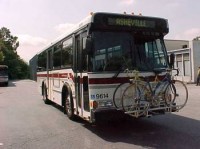With Strive Not to Drive Week, attention has turned to Asheville’s bus system, a flashpoint of no small amount of political debate. It’s a symbol, a line item in the city budget and, for thousands, a part of everyday life.
For most of its riders — 68 percent, according to a survey conducted as part of the transit master plan — the Asheville Transit System is a necessary utility, the only way they have to get from plae to place. For this population, it’s not a matter of striving not to drive. They have no choice but not to drive. It’s telling that, outside of downtown, the most-used bus stops are in the Hillcrest and Pisgah View housing projects.
City transit officials are aiming to change that, and get more “choice riders,” in transit jargon (as opposed to “captive riders” who have no other option). Everything from the art recently decorating some buses to a newly approved marketing campaign backed with federal stimulus funds. Those measures have had their critics. The art, in particular, hasn’t been well received in all quarters, and combined with news that the bus system wouldn’t run on Easter Monday, led many a transit user to grouse that they’d rather have better service than prettier pictures.
Transit was featured during the recent debates over the shape of the city budget. At one point, up to $600,000 in cuts was on the table. However, those cuts didn’t make it into the final budget.
That happened, in part, because the transit system has strong backing on Council, though its proponents emphasize slightly different aspects. Mayor Terry Bellamy, for example, balked at transit cuts because she said they would, in a recession, hit hard the working poor and people who depend on it for transportation. Meanwhile, transit proponents like Council members Cecil Bothwell and Gordon Smith have emphasized the positive environmental impacts. To many progressives, especially those activists who have most vigorously pushed the Transit Master plan, a good bus system is a major part of the Asheville they’d like to see. In same ways transit — communal, publicly run, more environmentally friendly than cars — is a potent progressive symbol and a harbinger of the cleaner, greener city they hope is coming to pass.
However, it’s not easy to push for many of the improvements that the master plan entails — like service on Sundays — in a tight budget climate. In talking about how best to implement transit improvements, Transit Planning Manager Mariate Echeverry said, “It’s going to be very difficult to grow the system if we don’t have more money.”
Also, not everyone sees eye to eye on the matter. During his tenure, outspoken conservative Council member Carl Mumpower quipped, several times, that “people vote with their feet and their feet are in cars,” and he voiced cynicism about whether Asheville truly had the size to support a wide bus system. Council member Bill Russell has said that he thinks the current level of subsidy to the transit system isn’t sustainable.
Transit skeptics, the harshest often coming from the right wing, frequently give the impression that they see the bus system as an example of what they dislike about the progressive view: a luxury that won’t work in Asheville, based on pie-in-the-sky visions. Moves like the art and marketing program are a target of particular ire.
Interestingly, an old roommate of mine, carless when we moved to the city, started riding the bus out of necessity. He had his complaints — the difficulty of a novice making sense of the system and the time it took to get across town chief amongst them — but became a transit proponent and still often rides the bus, now out of choice.
It remains to be seen if other Ashevilleans will make the same leap.
P.S. Full disclosure: I try to avoid using my car whenever feasible, but walking is by far my preferred non-carbon method of transportation. More on that, soon, as I strive not to drive today.



Before you comment
The comments section is here to provide a platform for civil dialogue on the issues we face together as a local community. Xpress is committed to offering this platform for all voices, but when the tone of the discussion gets nasty or strays off topic, we believe many people choose not to participate. Xpress editors are determined to moderate comments to ensure a constructive interchange is maintained. All comments judged not to be in keeping with the spirit of civil discourse will be removed and repeat violators will be banned. See here for our terms of service. Thank you for being part of this effort to promote respectful discussion.